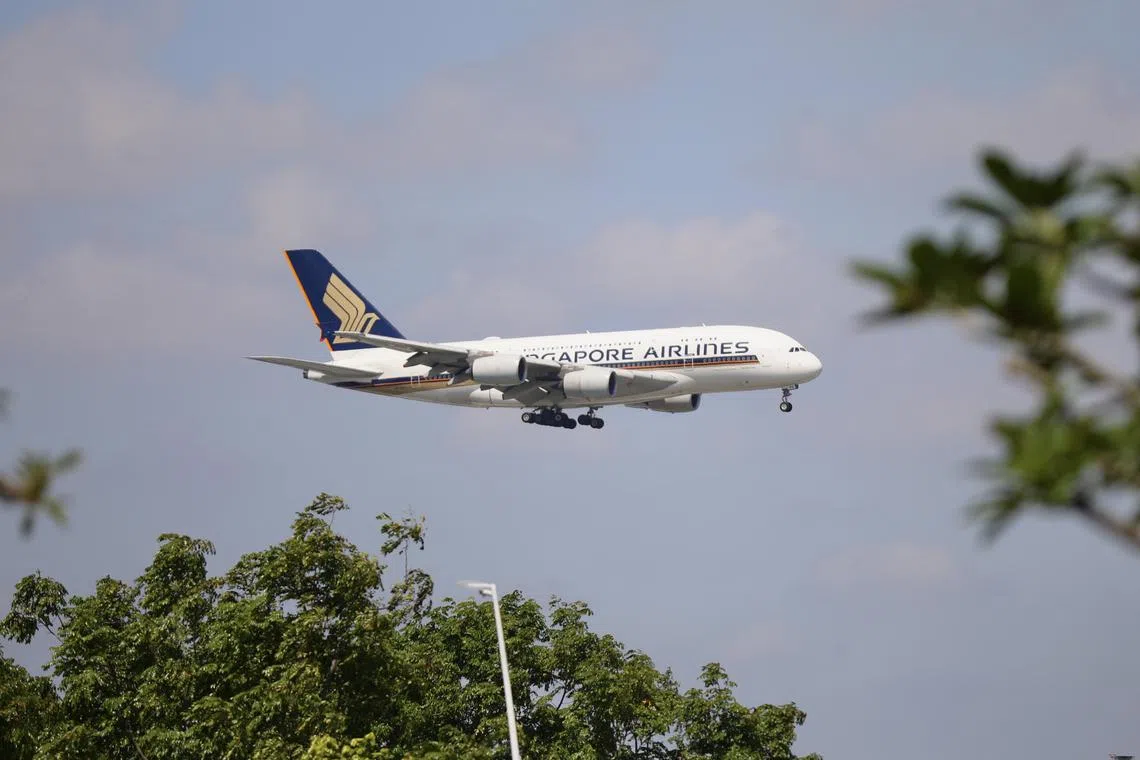SIA shares fall 1.7% in wake of Air India crash
Sign up now: Get ST's newsletters delivered to your inbox

Singapore Airlines holds a 25.1 per cent stake in Air India following the Indian carrier's merger with SIA-backed Vistara in November 2024.
ST PHOTO: TARYN NG
Follow our live coverage here.
SINGAPORE – Singapore Airlines (SIA) shares dropped on June 13, the day after an Air India plane crash
Shares of SIA, which holds a 25.1 per cent stake in Air India, were down 1.7 per cent, or 12 cents, at $6.91 as at the midday trading break, after earlier falling as much as 2.1 per cent. SIA’s shares eventually closed at $6.94, down nearly 1.3 per cent, on June 13.
Meanwhile, the Straits Times Index was down 0.5 per cent at midday as Asian markets fell after Israel carried out air strikes against targets in Iran sending oil prices soaring
The STI closed at 3,911.42 on June 13, down nearly 0.3 per cent.
A day earlier, Air India Flight AI171 bound for London from India’s Ahmedabad airport crashed outside the airport perimeter minutes after taking off, killing 241 people on board. It also killed people on the ground when it crashed into a medical college hostel.
SIA’s stake in Air India came about after the Indian flagship carrier merged with Vistara
SIA’s stake in the enlarged Air India allows it to participate directly in the fast-expanding Indian aviation market.
SIA and Air India also have a codesharing partnership.
In 2024, this partnership was expanded when the airlines announced the addition of 11 Indian cities and 40 international destinations to their codeshare network.
The two carriers also said they will increase their weekly scheduled codeshare services to 56, up from 14, and will codeshare on each other’s flights between Singapore and the Indian cities of Bengaluru and Chennai.
SIA told The Straits Times on June 12 that it is “offering full support and all necessary assistance to Air India during this time”.
It added: “Singapore Airlines extends our deepest condolences to all passengers, crew members and their families affected by Air India Flight AI171. Our thoughts and prayers are with everyone impacted during this difficult time.”
SIA in May posted a record $2.8 billion net profit
Morningstar regional director Lorraine Tan said: “The recent crash could weigh on near-term consumer perception and Air India’s earnings outlook, but we think any impact to demand will be short-lived.”
She added that at this stage, analysts see limited risk of the Israel-Iran strike expanding to involve other countries, but noted that oil prices may stay elevated.
“SIA maintains partial fuel hedging, so there could be short-term pressure on costs, but we expect fuel cost to be passed on eventually,” she said.
She noted that the recently announced closure of Jetstar Asia
“(It) allows SIA’s low-cost airline, Scoot, to take some market share. Scoot will take over Jetstar Asia routes to Okinawa in Japan from Changi Airport,” she said.
SIA will reportedly ramp up flights to various Asian destinations after Jetstar Asia stops operations on July 31. Scoot plans to launch new flights to Okinawa and Labuan Bajo in Indonesia.
The Air India crash marks the first-ever complete loss of a 787 Dreamliner, which has had an exemplary safety record. The aircraft Boeing introduced more than a decade ago has become a vital source of revenue for the US planemaker, with 1,148 of the jets in service globally.
“It is still too early to tell what happened, though it seems this was not likely a manufacturing or design issue given the age and usage history of the aircraft,” Citi analyst Jason Gursky wrote in a client note on June 12.
“The stock will likely trade down until we learn more.”
Boeing shares fell 4.8 per cent in New York on June 12, the biggest decline of any stock in the S&P 500 index.
Sue-Ann Tan is a business correspondent at The Straits Times covering capital markets and sustainable finance.



